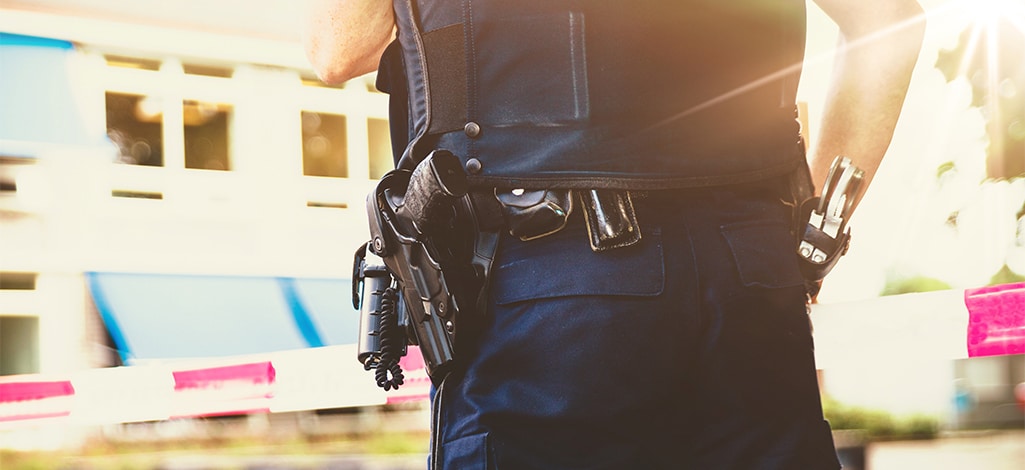In R v Aujla, 2021 ONSC 2417, R v Beresaw, 2021 ABPC 107, and R v Coutu, 2020 MBCA 106, the Ontario Superior Court of Justice, the Alberta Provincial Court, and the Manitoba Court of Appeal considered different aspects of what constitutes a breach of the Canadian Charter of Rights and Freedoms (the “Charter”) when police obtain evidence from a suspect and when that evidence should be excluded.
These cases provide different examples of when police conduct will result in the exclusion of evidence. In Aujla, the court admitted evidence despite a technical breach of the Charter. In Beresaw, the court excluded evidence as a result of a breach of the Charter, and in Coutu, the court found there was no breach of the Charter at all.
R V AUJLA, 2021 ONSC 2417
In Aujla, the accused was observed exiting a warehouse known to contain illegal narcotics with a block of an unknown substance wrapped in plastic wrap. The accused was then seen placing the substance in the front seat of his car and driving away. Later that afternoon, an officer located the subject vehicle and witnessed the accused change lanes without signalling. The officer initiated a traffic stop, approached the vehicle, and began asking the accused where he had been and if he could search a grocery bag sitting in the passenger seat. The accused refused and was arrested for possession of a controlled substance. The accused was searched for weapons and means of escape. During the search, the officer located $695 dollars in bills, $5.25 in change and a small black rock that resembled heroin. At that point, the officer advised the accused of his right to counsel. A second officer searched the accused’s vehicle. The officer told the accused any drugs recovered from the vehicle would be seized and tested. The accused was released unconditionally after he requested to speak to a lawyer. The officer did not facilitate contact with a lawyer because the accused was immediately released. He was subsequently arrested roughly three weeks later for possession of a controlled substance based on the evidence obtained at the traffic stop.
The accused brought an application to exclude the evidence on the basis that the arresting officer violated his sections 8, 9, 10(a), and 10(b) Charter rights. He argued that the police had no reasonable grounds to pull his vehicle over or detain him, and the traffic stop was used by the officer as a ruse in order to conduct a search of his vehicle without a warrant, thereby violating his section 8 and 9 rights.
In addition, the accused argued that, even if there were reasonable grounds for the arrest, his section 10 rights were breached because the arresting officer asked to look inside the accused’s grocery bags prior to telling him that he was pulled over on the basis of a suspicion that he had drugs in a bag on his front seat, and before he was advised of his right to counsel.
Regarding the section 8 and 9 violations, the court found that the arresting officer had two lawful reasons for detaining the accused. The first was pursuant to a valid road safety purpose, as the officer saw the accused change lanes without signalling. The second was reasonable and probable grounds to believe that the accused was trafficking a controlled substance that went beyond a mere suspicion.
The Crown conceded that asking what was inside the grocery bags before informing the accused of his right to counsel violated the accused’s section 10(a) and 10(b) rights.
The court found that, despite the breach, the evidence should not be excluded. While the breach went beyond a mere technical breach, the officer did not display a willful or flagrant disregard for the accused’s rights. His questions were limited, and the accused was advised of his rights within 7 minutes of the detention, and within 5 minutes of his arrest. Finally, the impact of the Charter breach was minimal: the accused made no self-incriminating statements and all the evidence was obtained after the accused was advised of his section 10 rights.
R V BERESAW, 2021 ABPC 107
In Beresaw, the court excluded the accused’s breath samples from evidence after finding they were taken in violation of the accused’s section 8 right to be free of unreasonable search and seizure. Mr. Beresaw was lawfully detained in order to confirm his sobriety. He was specifically targeted by police following complaints received from his neighbours alleging that he habitually drove drunk. On the night in question, the accused was stopped at 10:33 pm. A breath sample by means of an approved screening device was taken, which Mr. Beresaw failed. He was arrested and read his Charter rights.
At 10:41 pm, the accused requested counsel. For the next 27 minutes, the arresting officer remained on the scene with the accused. He declined another officer’s offer to remain at the scene, instead choosing to do so himself with the accused. He also declined to participate in social distancing required as a result of the COVID-19 pandemic, despite the accused’s request, and spent time gloating over catching the accused to his colleagues. At 11:08 pm, the accused and the arresting officer left the scene. For 36 seconds, while transporting the accused, the officer removed both hands from the steering wheel while travelling at 70km/h in order to type notes. After arriving at the district office, the officer instructed the accused to remove his mask. Mr. Beresaw was given access to a lawyer at 11:32 pm, and the first breath sample was taken at 11:53 pm.
The accused argued that the samples obtained should be excluded from evidence, on the basis that they were not taken as soon as practicable due to an unexplained and improper delay. In its reasons, the court reiterated that a stop to check on driver sobriety is a constitutionally permissible intrusion into a person’s right to be free of arbitrary state detention, but such an intrusion must be kept to a minimum and breath samples must be taken as soon as practicable. “As soon as practicable” does not mean immediately, but the delay must overall be reasonable in the circumstances.
In this case, the one hour and ten minutes from when Mr. Beresaw was detained to when he provided a breath sample was unreasonable. The nearest police station was a 10-minute drive away, and the arresting officer chose not to leave the scene with Mr. Beresaw when backup arrived, took excessive time note-taking, and spent time “gloating” to his colleagues.
After finding the accused’s Charter rights were violated, the court excluded the evidence on the basis of the arresting officer’s conduct. The breach was serious and could not be saved by reliance on good faith. The arresting officer’s conduct overall showed that he took a cavalier attitude to his duties, including:
- not wearing a mask while in continuous close contact with the accused in the midst of a pandemic and directing the accused to remove his own mask while in close, confined spaces;
- directing the accused to stop attempting to maintain social distancing;
- removing both of his hands from the steering wheel to type for 36 seconds while transporting the accused; and
- engaging in chit-chat, excessive note-taking, and bragging to his colleagues about how he had apprehended Mr. Beresaw.
The court concluded that both the impact of the breach on Mr. Beresaw’s rights, and society’s interest in criminal cases being decided on the merits supported excluding the evidence in order to recognize the importance of minimizing state conduct that breaches the right to be free of unreasonable search and seizure.
As an aside, the court also noted that stopping Mr. Beresaw was still technically a random sobriety stop, despite the fact that Mr. Beresaw was specifically targeted for investigation as a result of a complaint of habitual drunk driving. The court stated that it being random as to the time and day of the stop was enough to satisfy the randomness requirement, and the stop was no less valid when conducted under the authority of checking on driver sobriety than after observation of weaving or making an un-signalled lane change.
R V COUTU, 2020 MBCA 106
While moving a stash of illegal weapons, Mr. Coutu crossed paths with police who were in fresh pursuit of robbery suspects. His appearance, clothing, and footwear were similar to the robbery suspect. When stopped by police, the accused gave the impression he was about to flee. He was arrested and searched. A loaded sawed-off rifle, two throwing stars and an air pistol with a silencer were found in his backpack.
At trial, the judge declared the arrest illegal and the warrantless search of the backpack unreasonable; however, the weapons evidence was not excluded because doing so would bring the administration of justice into disrepute. The trial judge found that a fit sentence would total 5.5 years in prison. He reduced the sentence to 5 years in recognition of the “alarming” nature of the police conduct. The trial judge considered the arrest to be a deliberate disregard for the accused’s rights, and he characterized it as an example of the police department’s pattern of systematically ignoring the rights of citizens. He reduced the sentence by six months to send a message to the police.
On appeal, the court found the trial judge had failed to consider all of the relevant circumstances known to the arresting officer when determining that the search was unreasonable, including that the accused appeared to attempt to flee. Flight, or other suspicious behaviour, is a factor a police officer can rely upon to support other grounds to arrest where indicia of such behaviour occurs before the arrest is made.
Secondly, the Court of Appeal found there was no state misconduct that would justify a sentence reduction absent a Charter breach. While the police did make an arrest based on a mistaken identity, they treated the accused professionally, fairly and acted diligently to exclude him from the robbery. There was no police misconduct which could be used as a mitigating factor on sentencing. Ultimately, the court increased the accused’s total sentence to 6 years, minus credits for pre-trial custody.
CONCLUSION
The courts’ analysis in the above cases offer insight into the type of officer conduct which can militate against admitting evidence where officers have breached the Charter or otherwise engaged in misconduct. As Beresaw and Aujla demonstrate, where a Charter breach has occurred, an officer’s intentions when engaging with the accused can be a paramount consideration.
When obtaining evidence, whether via a roadside sobriety stop or a search incidental to arrest, police must be alive to the need to treat the accused professionally and fairly, and to act diligently.
For more information, please contact David McKnight or Naomi Krueger.




